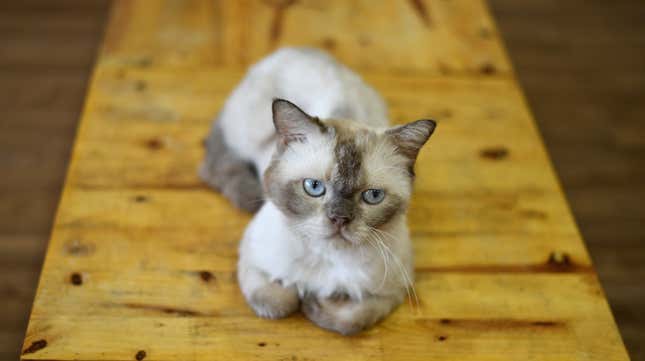
New research points to an important distinction between cats and dogs when it comes to reading certain social cues. It found that cats, unlike dogs, won’t necessarily avoid people who have wronged their owners.
In 2015, a group of researchers in Japan published a study looking at how dogs would respond to people who had recently treated their owners poorly. They had the dogs see a situation in which a third party would either help the owner move junk after being asked to or turn their back on them. As a control, some would turn their back on the owner without any prior request for help (a second non-owner was included as a neutral observer in all the scenarios). Then they had the third parties offer the dogs a treat.
The dogs were just as likely to take food from people when they helped or didn’t interact with the owner. But when the third party spurned the owner’s plea for help, the dogs seemingly took it personally and tended to avoid taking the treat from them. The findings, the researchers wrote, indicated that dogs can socially eavesdrop, just as people and even other primates can.
Years later, the same group of researchers have now replicated their experiment using cats, publishing their findings in the February issue of Animal Behavior and Cognition.
The study involved 36 cats, young and old alike. Some were household pets, while others were living at a cat cafe (the “owner” in these cases was a staff employee who frequently interacted with the cats). The cats saw the same basic set-up as before, with a third party either choosing to help their owner open something or not. The cats weren’t any less likely to turn down free food when it came from the hands of their owner’s nemesis than when it came from their ally. This was seen across different ages and in both the cafe and household cats.
Animal behavior research is always tricky, and the researchers acknowledge that there are explanations for their findings that have nothing to do with a cat’s capacity for loyalty. It’s possible, for instance, that the cats simply didn’t recognize the act of someone not helping their owner open a container as negative behavior. But if the findings are valid, it’s probably yet another sign of the different evolutionary journeys that cats and dogs have taken alongside humankind.
“We consider that cats might not possess the same social evaluation abilities as dogs, at least in this situation, because unlike the latter, they have not been selected to cooperate with humans,” the study authors wrote.

Dogs have been in humanity’s orbit longer than cats, for one. And even before we started teaming up to tackle common goals, dogs’ ancient ancestors were thought to frequently cooperate with one another to hunt and survive. Cats, as the researchers politely put it, “originated from a less gregarious ancestor than did dogs,” and we haven’t bred or trained them to perform specific tasks with us anywhere near as much as we have with dogs.
Of course, just because cats might not read some social cues as well as dogs, that doesn’t diminish their potential for human affection. Other research has shown that cats readily form social bonds with people, and that they can interpret facial and body language from their owners.
The researchers note that their findings might play into preconceived notions of cats being selfish and less expressive than dogs. But they also point out that cat owners are less likely to agree with those stereotypes. Without making judgement either way, they hope their and others’ ongoing work can help everyone understand their pets a bit better.
“Further empirical research comparing the socio-cognitive abilities of cats and dogs might contribute positively toward improving overall pet-human relationships,” they wrote.